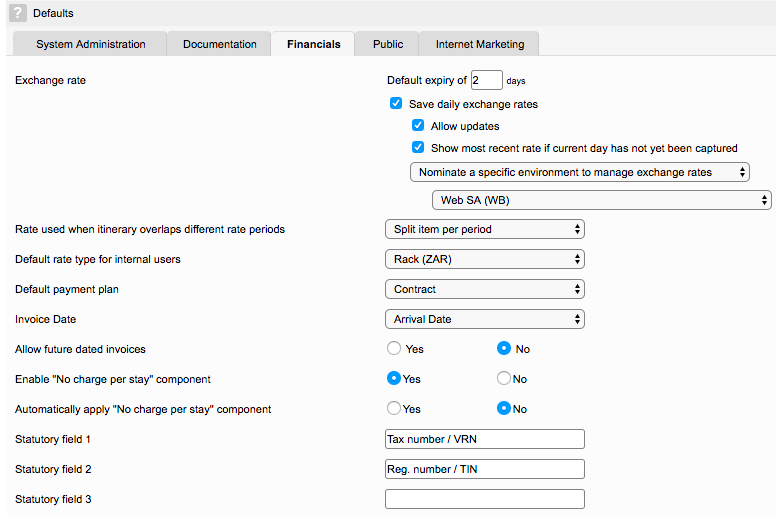
Financials
The settings on the Financials tab affect various aspects of your pricing and invoice processing.

Exchange rate
Apply default exchange rate settings.
| Field | Description |
|---|---|
| Default expiry of _ days | This option is no longer actively used in the system. |
| Save daily exchange rates | If you turn on this option, then the first time in a day that you use an exchange rate anywhere in the system, e.g. when generating an invoice, that rate will be automatically stored in the system for subsequent use, i.e. that rate will be displayed as a default next time an exchange needs to be applied between those currencies on that day. |
| Allow Updates | By selecting this option, you can also specify whether, if a user changes the default when it appears on a transaction, the changed rate is to be applied on future transactions. |
| Show most recent rate if current day has not yet been captured | By selecting this option, the most current exchange rate will continue to be applied on future dates until such time as a new rate is entered and becomes the default. |
| Selection options | You have the option of limiting the updating to a specific environment, e.g. Reservations Office, or permitting updates to be made at any environment. |
Other settings
| Field | Description |
|---|---|
| Rate used when itinerary overlaps different rate periods | When an itinerary line spans 2 or more rate periods, e.g. starts in Low Season and ends in High Season, you can select whether to apply the first day’s rate for whole stay, or to apply the prices of the respective periods. In the latter case, the system will automatically split the itinerary item into a separate line for the applicable dates of each different rate. |
| Default rate type for internal users Default payment plan | When an Internal User, i.e. a consultant within your own organisation, creates a new booking the process commences with a default Rate Type and payment Plan in place. This is where you choose what the defaults will be. We would advise you select the rate and payment plan applicable to Direct guests. |
| Invoice Date | The Default Invoice Date is very significant for your financial reporting. Several Financial reports offer the option of attributing the full value of a Folio / Invoice either to the Invoice Date, or to the calendar dates. For example, on a booking that arrives on 30th Jan and departs on 2 Feb, the calendar date option will place 2 days value in Jan and 1 day in Feb. On the other hand, a report by folio date will attribute the full value of the booking to the date of invoice. Where selection of the default invoice date comes into play is when you are reporting by folio date on folios that have not yet been invoiced. In such a case, the default selection you have made on this screen between Arrival or Departure date will determine where the value is placed. This selection also determines which date will be pre-populated as the invoice date when you are generating an invoice. |
| Allow future dated invoices | If the option this option is set to ‘No’, the system will apply that rule at the time when invoices are generated. |
| Enable “No charge per stay” component Automatically apply “No charge per stay” component | These options are no longer actively used in the system. We advise you leave them set to ‘No’. |
| Statutory field 1, 2, 3 | These options enable you to set default labels for a maximum of 3 statutory fields for Tax / TIN / VRN numbers. The numbers for these labels are then added on the Business structure and Contact screens which display on the system documents. |
Keep up to date with us
Menu
Visit our website
ResRequest Modules
- Business Intelligence
- Central Reservations
- Channel Management
- Customer Relationship Management
- Developer
- Email Series 2022
- Email Series 2023
- Financial Management
- Marketing tools
- Payment Gateways
- Point of sale
- Product
- Professional Services
- Property Management
- ResConnect
- ResInsite
- ResNova
- System Setup
- Technical Alerts
- Technical Tips
- Telephone Management
- Webinars Index


